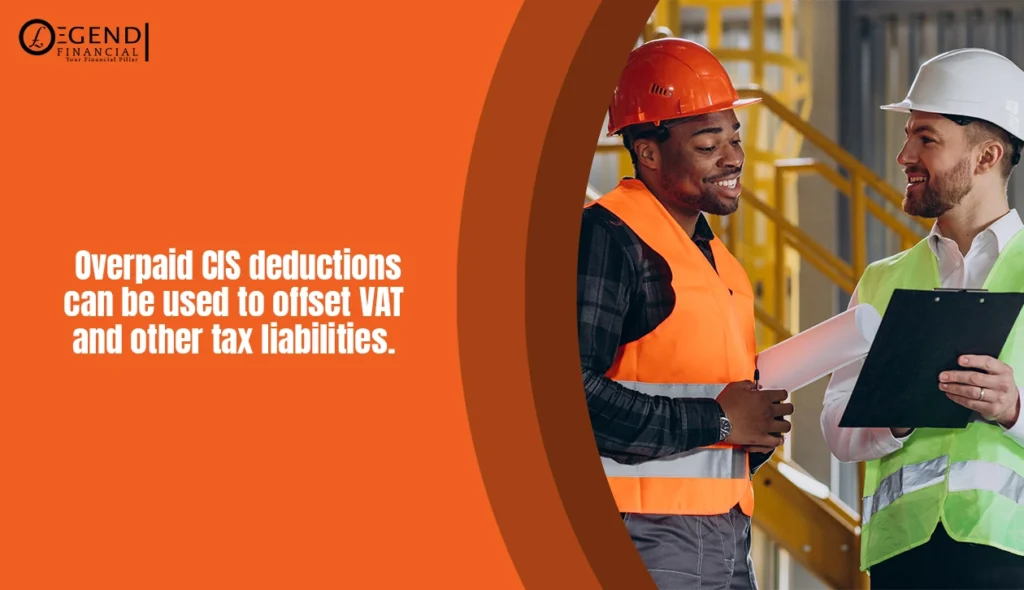Contents
If you are part of the Construction Industry Scheme (CIS), you might be due a CIS repayment from HMRC. This article will walk you through everything you need to know about CIS refunds, including who can claim and how to, common mistakes whilst filing, and more.
What is a CIS Repayment Claim?
Under the Construction Industry Scheme, contractors deduct money from their subcontractors’ payments and pay this portion toward their National Insurance and income tax. Sometimes, this leads to subcontractors paying more tax than they owe. Basically, CIS overpayment happens when:
- You did not earn enough money to pay that much tax.
- You had business expenses supposedly deductible from your taxable income.
You need to make an HMRC CIS repayment claim to get back the extra tax you have paid. You can claim online or by post.
For more details about CIS, read our complete guide for contractors and subcontractors
How Deductions Work Under CIS
The amount deducted for CIS depends on whether or not the subcontractor is registered with HMRC.
- If you are registered, your deductions are at 20%.
- If you are unregistered, your deductions will be 30%.
Other Option: Subcontractors with a history of strong tax compliance can apply for gross payment status, which means no tax deductions upon payment. In this status, take note that you will still be responsible for paying your tax and NICs at the end of the tax year.

Who Can Make a CIS Repayment Claim?
Subcontractors and limited companies registered with HMRC can claim a CIS tax refund. You can also hire an agent to claim CIS refund for limited company.
- Limited companies can claim CIS deductions suffered using an Employer Payment Summary (EPS) through their payroll system each month.
- Sole traders and partners can claim CIS tax overpayments through their Self-Assessment tax returns.
Even if you have a bad tax history, you can still claim CIS refunds. Visit relevant article about Payment and Deduction Statements.
When Can You Claim a CIS Refund?
You can claim back your HMRC CIS repayment 2024 after 5 April 2025, when the tax year ends. Claims must be submitted within four years from the end of the relevant tax year regardless of whether the claimant is still working in construction.
Common Reasons for CIS Overpayments
1. Fluctuating Income and Overdeductions
Construction projects often come with unpredictable cash flow, which can lead to excessive CIS deductions during peak income periods. Your limited company might experience periods of high income with high CIS deductions, followed by quieter periods with lower income.
2. Claimable Expenses
Properly claiming tax-deductible expenses can reduce a company’s taxable income, leading to a lower corporation tax liability, and potentially a CIS refund. Limited companies in construction incur a wide range of allowable business expenses such as:
- Materials and equipment
- Travel and vehicle costs
- Staff wages and subcontractor fees
- Office expenses and training costs
Pro Tip: Use reliable accounting software to track and categorise expenses with greater accuracy.
3. Misreporting and Complex Tax Calculations
Your company might qualify for tax reliefs or allowances that reduce your overall tax liability. If these are not factored in, your CIS deductions could exceed what you owe. Incorrectly claiming CIS deductions through corporation tax returns instead of through PAYE submissions can lead to CIS penalties.
4. Timing Differences
Limited companies sometimes have accounting periods that do not align perfectly with the tax year. This timing mismatch can result in CIS overpayments, particularly when filing corporation tax returns. Accurate bookkeeping and reconciling CIS deductions with real-time liabilities can prevent this from happening.
How to Make a CIS Repayment Claim
The process depends on how you are taxed. If you are self-employed, either as a sole trader or part of a partnership, you can claim your CIS deductions through your Self-Assessment tax return. However, if you operate as a limited company, you must offset your CIS deductions against your PAYE liabilities or corporation tax.
The claim can be made online using the CIS Repayment i-form, by post via your tax return, or through an authorised agent. HMRC will review your claim, and if approved, they will issue your repayment or adjust future tax liabilities accordingly.
Common Mistakes to Avoid: Essential Tips for Subcontractors
Claiming a CIS repayment is a straightforward process, but some mistakes can lead to delays, reduced refunds, or even penalties. Be wary of these:
1.Incorrectly Claiming Allowable Expenses: Keep organised records of all business-related expenses. Only claim expenses that are work-related (such as the trading allowance) and meet HMRC’s criteria.
2. Claiming Before the Tax Year Ends (5 April): HMRC only processes refunds after 6 April. Filing early can cause processing delays or incorrect refund amounts.
3. Limited Companies Claiming CIS Deductions Incorrectly: Keep clear records to separate CIS deductions from corporation tax claims. Consult with our tax accountants to avoid errors and ensure compliance.
4. Incomplete Records: Poor record-keeping can reduce CIS repayments or cause rejections. Subcontractors must ensure that they keep CIS payment and deduction statements up to date, maintain accurate business details, including a Unique Taxpayer Reference Number (UTR), CIS registration number, and VAT registration number (if applicable).
5. Not Considering Gross Payment Status for Large Repayments: Receiving large amounts of CIS repayments can trigger a review of your payment status by HMRC. If your financial situation changes (e.g., reduced turnover), inform HMRC immediately. Abruptly losing your gross payment status can affect your future cash flow.
When Do You Receive Your CIS Repayment?
Once you have submitted your CIS repayment claim, it takes about 40 working days to process. However, if your refund is particularly large or it is your first time claiming, it may go through additional security checks, which may further delay your refund.
Tip: Granting agent authorisation to your accountant can fast-track the process and ensure your claim is handled smoothly and efficiently.
FAQs About CIS Repayment Claims
Key documents required for CIS refund claim include CIS deduction statements, UTR number, tax return details, and business expense records.
“CIS suffered” is the amount of tax deducted from your payments by contractors under the CIS scheme. The CIS deductions you have suffered as a subcontractor can be used as a CIS offset against corporation tax when calculating your company’s overall tax liability.
Working with a professional accountant is not necessary but it can greatly improve your chances of a successful claim and expedite the process.
If you have not received your CIS refund for more than 40 working days, it may be due to system issues, HMRC investigations, or incorrect filings. Check your HMRC accounts for confirmation.
Streamline Your CIS Affairs with Legend Financial
Claiming a CIS repayment can be tricky and time-consuming, and any mistake can lead to delays or reduced refunds. Without expert guidance, you risk missing out on the amount HMRC owes you. This is where Legend Financial can help. We help ensure you file claims accurately and maximise refunds. We handle CIS matters daily, so you can trust us with yours. Get in touch with our CIS specialists today!










